 Nvidia are extending their expertise in providing the chippery for portable devices by buying PortalPlayer, who are responsible for the controlling chips for the hard-disk-based iPods, or “powers some of the world’s most recognizable portable digital music players,” as they chose to describe it.
Nvidia are extending their expertise in providing the chippery for portable devices by buying PortalPlayer, who are responsible for the controlling chips for the hard-disk-based iPods, or “powers some of the world’s most recognizable portable digital music players,” as they chose to describe it.
Nvidia will pay $13.50 in cash for each outstanding share of PortalPlayer common stock, which adds up to approximately $357 million, dropping to around $161 million excluding the cash PortalPlayer’ has on its balance sheet.
Highlighting the companies logic in buying PortalPlayer, Jen-Hsun Huang, president and CEO of Nvidia enlightened all, “Modern mobile devices are miniaturized yet powerful multimedia computers. At the core of their architectures are complex Application Processors integrating microprocessors, system logic, networking, and multimedia processors.”
There’d been some speculation that Nvidia might have sold out to Intel, following their graphics-chip competitor ATi being bought by AMD, but moves like this make it clear that they’re taking a different path. This was outlined by Huang, “With this acquisition, we are combining the two essential technologies of next-generation PMPs, PDAs, portable game players, and phones: PortalPlayer’s innovative Application Processor technology and NVIDIA’s industry-leading GPU technology. With the products created through this combination, we intend to drive the next digital revolution, where the mobile device becomes our most personal computer.”
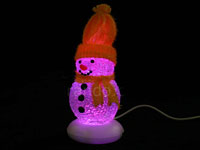 If you’re having problems thinking of that perfect technological widget to make your Christmas go with a seasonal swing, look no further than Brando’s fabulous feast o’ festive trinkets.
If you’re having problems thinking of that perfect technological widget to make your Christmas go with a seasonal swing, look no further than Brando’s fabulous feast o’ festive trinkets. USB Fibre Optic Christmas Tree II
USB Fibre Optic Christmas Tree II USB LED Music X’mas Tree
USB LED Music X’mas Tree USB Drumming Santa
USB Drumming Santa With the evenings drawing in and artic breezes circulating around your workstation, it may be time to invest in some handy USB-powered warming devices.
With the evenings drawing in and artic breezes circulating around your workstation, it may be time to invest in some handy USB-powered warming devices.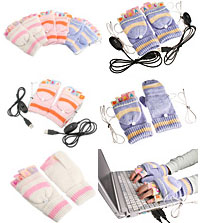 USB G-Gloves for girlies
USB G-Gloves for girlies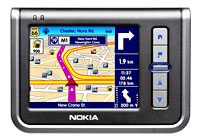 Nokia has announced its first dedicated personal navigation device covering all of Europe-land, the Nokia 330 Auto Navigation.
Nokia has announced its first dedicated personal navigation device covering all of Europe-land, the Nokia 330 Auto Navigation.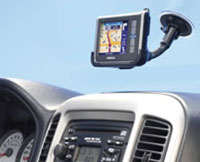 And now some corporate guff
And now some corporate guff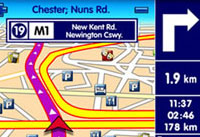 “Finding your way across Europe is simple with this comprehensive navigation package, including an integrated GPS receiver and European maps,” he added.
“Finding your way across Europe is simple with this comprehensive navigation package, including an integrated GPS receiver and European maps,” he added.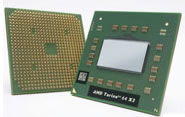 AMD, the second largest microprocessor manufacturer has complete the purchase of graphics, chipset and CE specialist ATi Technologies in a deal worth around $5.4Bn.
AMD, the second largest microprocessor manufacturer has complete the purchase of graphics, chipset and CE specialist ATi Technologies in a deal worth around $5.4Bn. The capabilities of graphics processors have been gathering pace over the recent years to the point where they come close to rivaling the main processor themselves.
The capabilities of graphics processors have been gathering pace over the recent years to the point where they come close to rivaling the main processor themselves. The almighty ruck between Blu-ray and HD-DVD could have found a bridge for the consumer.
The almighty ruck between Blu-ray and HD-DVD could have found a bridge for the consumer.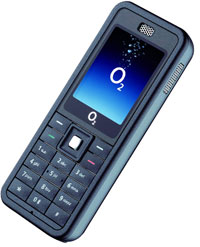 Primed and ready for take off, O2’s own-brand Jet supersonic mobile boasts that it can deliver 67% more talk time than its nearest comparable rival.
Primed and ready for take off, O2’s own-brand Jet supersonic mobile boasts that it can deliver 67% more talk time than its nearest comparable rival.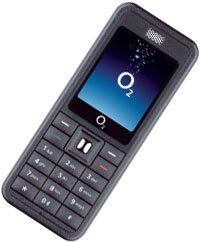 The phone’s business-like styling reflects its targeted demographic, with an austere black casing and ne’er a whiff of any fun stuff to be found – this grumpy old handset hasn’t even got a camera or an MP3 player.
The phone’s business-like styling reflects its targeted demographic, with an austere black casing and ne’er a whiff of any fun stuff to be found – this grumpy old handset hasn’t even got a camera or an MP3 player.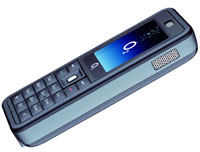 The O2 Jet will be ready for slipping into pin striped suit pockets from 19th October, with prices varying according to monthly tariffs. There will also be a pay-as-you-go (PAYG) version available for sixty quid.
The O2 Jet will be ready for slipping into pin striped suit pockets from 19th October, with prices varying according to monthly tariffs. There will also be a pay-as-you-go (PAYG) version available for sixty quid.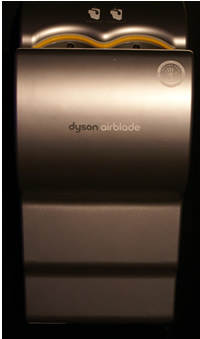 Dyson have this morning launched a new product, the Dyson Airblade, a replacement for tired old hand dryers.
Dyson have this morning launched a new product, the Dyson Airblade, a replacement for tired old hand dryers.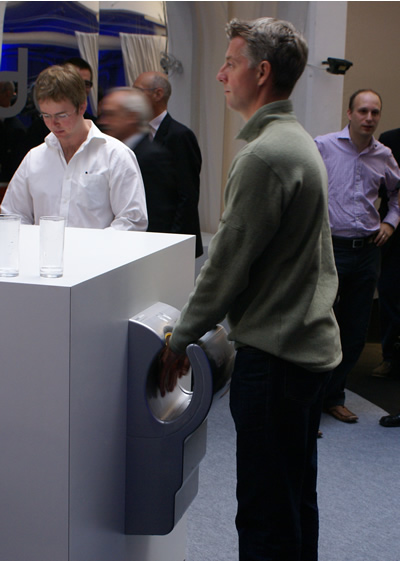
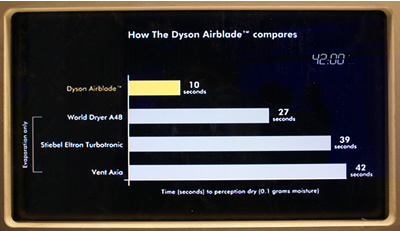
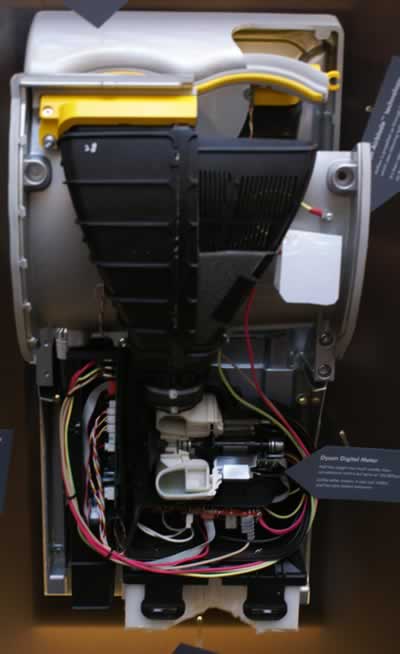
 CSR, a chipset design lab in Cambridge that specialises in radio, has released a voice over WiFi design (UniVox) which a bill of materials of around £11.00.
CSR, a chipset design lab in Cambridge that specialises in radio, has released a voice over WiFi design (UniVox) which a bill of materials of around £11.00. Both SIP (version 2) and IAX2 (Inter Asterisk Protocol v2) are supported. IAX is useful in NAT environments as it can traverse NAT without any special software, while SIP can be a complete headache.
Both SIP (version 2) and IAX2 (Inter Asterisk Protocol v2) are supported. IAX is useful in NAT environments as it can traverse NAT without any special software, while SIP can be a complete headache.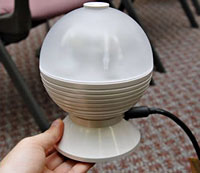 We can’t say we like the thought of being bombarded by different whiffs while we’re listening to the radio, but it seems someone in Japan liked the idea so much that they’re about to launch a fragrance-pumpin’ product in October.
We can’t say we like the thought of being bombarded by different whiffs while we’re listening to the radio, but it seems someone in Japan liked the idea so much that they’re about to launch a fragrance-pumpin’ product in October.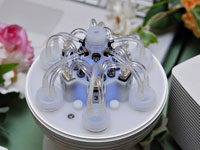 The gadget connects to your desktop via USB, with the PC downloading the aroma instructions from the radio station via the Internet, with odorous wafts synchronised to match whatever song is currently being played.
The gadget connects to your desktop via USB, with the PC downloading the aroma instructions from the radio station via the Internet, with odorous wafts synchronised to match whatever song is currently being played.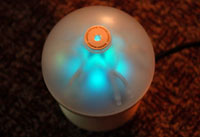 The USB Aroma Geur is available for 49,900 Yen ($430), with the service scheduled to start up in Japan from 2nd October 2006.
The USB Aroma Geur is available for 49,900 Yen ($430), with the service scheduled to start up in Japan from 2nd October 2006.